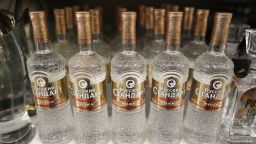Russian-made vodka brands face intense backlash, with calls for boycotts spreading this week to about a dozen US states including Virginia, Oregon, Iowa and North Carolina.
“This puts Russian vodka brands in a precarious position, as prolonged conflict will not only damage immediate sales, but may also cause permanent disillusionment against Russian commodities in the long-term,” Carmen Bryan a consumer analyst at GlobalData, said in a note Thursday.
Large chains, such as Publix and Total Wine & More, also joined in. In a statement, Publix said it “stands with the people of Ukraine” and that the removal of Russian vodka showed their support for them. Publix operates liquor stores only in Florida.
Total Wine & More, the country’s biggest liquor retailer with more than 200 locations in roughly 30 states, pulled Russian products off its website and store shelves. Searching for “Russian vodka” now points digital shoppers to Ukrainian-made vodka and beer instead.
Russian Standard vodka can handle the blow of these boycotts since its owner, Roustam Tariko, is a billionaire who also owns Russian Standard Bank. The brand hasn’t returned CNN Business’ request for comment.
But smaller companies that import Russian vodka and have roots in the United States told CNN Business that they will feel the pain. For example, one of the brands targeted is Hammer and Sickle, which is owned by Massachusetts company Klin Group.
In a statement, the company said it’s “saddened by the abhorrent war” in Ukraine and understands the boycott, but their situation is much different than that of larger companies like Russian Standard. Produced by a Russian family, Klin started importing vodka in 2007.
The company said that “predominantly Massachusetts residents” designed the bottle and developed the marketing and that Klin a “100% US-owned company.”
“Although we understand the boycott of Russian products, we must point out that the invasion of Ukraine are the actions of the Russian government,” the company said. “Boycotting our vodka does not hurt the Russian government in the least, but it hurts a Russian family and six Massachusetts families who had a dream to provide phenomenal Russian vodka at an affordable price.”
A similar sentiment was echoed to CNN Business by Dave Katz, the owner of Zyr vodka. He said the product is “made by very good people” in Russia that “don’t want war.”
“All of the small profit we make stays in the US, paying for my sales team, promotional models, distributors, social media firms, publicists, designers, point of sale manufacturers, printers and much more,” Katz said. “We will be the only people effected by discontinuing Zyr. Russia will never feel this. Putin surely will not feel this.”
Despite being closely associated with the country, very few US consumers buy vodka that is actually made in Russia.
“There is not a lot of Russian-made vodka in the US marketplace,” Lisa Hawkins, senior vice president for public affairs for the Distilled Spirits Council, told CNN Business. “Imports of Russian vodka to the United States are down nearly 79% since 2011, and accounted for only 1.3% of total vodka imports in 2021.”





























